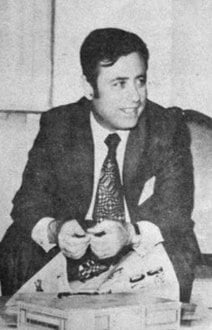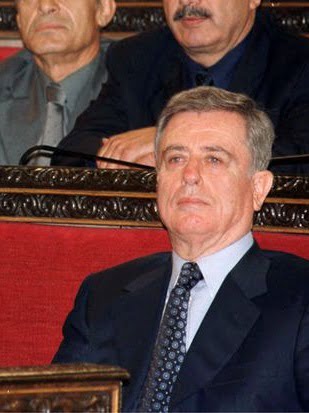About Him
Mr. Abdul Halim Khaddam was born in 1932 in the city of Baniyas, Tartous Governorate. He joined the ranks of the Baath Party in 1949 and worked as Secretary of the Banias Division. He obtained a law degree from the University of Damascus in 1952 and was imprisoned several times during the rule of President Adeeb Shishakli for his partisan activity. He was exiled with the Baathist leaders to Cairo in 1959 and worked there in the Department of Social Affairs and Labor and returned to Syria after the separation to work as a lawyer in the city of Latakia, and then he was chosen as a member of the leadership of the Latakia branch of the Arab Socialist Baath Party
In March 1964 he was appointed governor of the city of Hama, then he was appointed governor of Quneitra in September 1964, and starting from October 20, 1965, he was appointed governor of Damascus until 1969, when he was appointed Minister of Economy and Foreign Trade on March 29, 1969 in the government that was formed at that time, during which he took a series of corrective measures. The most prominent of which is providing the necessary guarantees for foreign investment and taking upon himself the task of encouraging tourism. He also attached special importance to the development of the port of Latakia and the port of Tartous. In 1970 he was chosen as a member of the National Command, then a member of the National Command. He was also appointed Minister of Foreign Affairs in the Ministry that was formed on November 9, 1970. He took it upon himself to extricate Syria from its Arab and international isolation and to open up its relations and foreign policies. Khaddam participated in the negotiations that led to Syria’s accession to the Cairo Declaration signed by Egypt, Libya and Sudan, which calls for the gradual unity of the signatory countries. In December of the same year, he made an official visit to Beirut with the aim of restoring the Syrian-Lebanese relations to normal. This new transformation included the restoration of normal relations with most of the Arab governments (Saudi Arabia, Kuwait, Morocco, Tunisia) and a review of Syria’s position on Security Council Resolution No. 242, which was previously rejected.
The October 1973 war opened the way for him to use his diplomatic skills, so he participated in the separation of forces negotiations with Israel that took place on May 28, 1974, and he left for Washington on August 21 of the same year to lay the foundations for the next stage of negotiations, but his negotiations with Henry Kissinger did not give the desired results because of giving The United States priority to sign the agreement on the southern front between Egypt and Israel.
His passing


Since that time, the importance of Khaddam’s role increased, and he was appointed as Deputy Prime Minister in addition to his position as Minister of Foreign Affairs in the government of Mr. Mahmoud Al-Ayyubi, which was formed on 1-9-1974. He worked to consolidate efforts to mobilize support for Syria’s policy in order to strengthen its position in preparing for the upcoming negotiations on the Arab conflict. Israel and Syria’s leadership role in the region and worked to unify the Arab efforts in this conflict, which led to the establishment of the unified Syrian-Palestinian leadership in 1975 and then the Syrian-Jordanian supreme leadership to establish a close relationship between the two countries economically and militarily. Khaddam also worked on the file of the crisis in Lebanon and revealed during his visit to Kuwait that His country’s goal is to establish an Arab front extending from Ras al-Naqoura to Aqaba. Within this strategy, he worked to achieve the Syrian-Lebanese-Palestinian agreement in 1976, and in 1978 he led negotiations with Iraq to reach a joint action charter signed by Presidents Hafez al-Assad and Ahmed Hassan al-Bakr. Khaddam continued as foreign minister until 1984, where he was appointed First Vice President of the Republic and responsible for foreign policy. He succeeded in Lebanon in signing the tripartite agreement to stop internal fighting, and then he participated with the Kingdom of Saudi Arabia in signing the Taef Agreement. The region established a balance in relations between the relationship with the Soviet Union and the relationship with the United States of America.
Khaddam had positions on the internal policies of Assad the father, so he objected to many laws and the corruption of the Assad family (as we will see in the memoirs). Khaddam signed decrees handing over Bashar al-Assad the presidency of the Syrian Arab Republic. After Bashar al-Assad received power, Khaddam worked on laws to develop political work and allow opposition parties in Syria to develop democratic work. He also worked on the file of economic openness with a group of experts and on the file of developing administration with the state. French as a result of his personal friendship with President Jacques Chirac, but he was disappointed and became fully convinced that the issue of democracy and development would not be allowed by the Assad regime, so he decided to resign at the first country conference.
Khaddam submitted his resignation from all his political and party positions at the country conference in June 2005. He delivered his speech before his resignation, criticizing the internal and external policy of Bashar al-Assad, which is leading Syria towards ruin. He moved to France, where he declared his opposition to the regime. In June 2006, Khaddam formed with the Muslim Brotherhood and a large group of Syrian politicians in Abroad National Salvation Front.
After the start of the Syrian revolution, Khaddam worked to support the revolution and sent a set of letters to Arab and foreign leaders to support the Syrian people in their popular revolution to obtain freedom and called for international military intervention against the criminal regime that kills defenseless Syrians.
Abdel Halim Khaddam passed away on March 31, 2020
